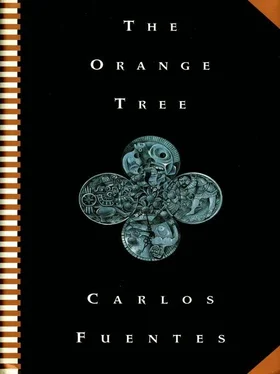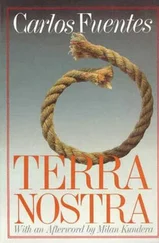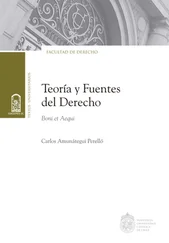I realize I’m looking at an event from the past. This is what I saw when I first arrived here. I try to dismiss this mirage and see what’s happening today, but I can’t distinguish between the two events. Another bird becomes visible in the sky. It comes closer, first barely a dot, then a brilliant star, so brilliant that it blinds me when I compare it to the sun. The bird descends toward the gulf. From its belly emerge two feet as huge as canoes, and, with a horrifying grunt that silences the terrified shrieking of the caracara, it settles on the water, raising a cloud of foam.
Everything becomes calm. The bird has doors and windows. It’s an air house. A combination of Noah’s ark and the Pegasus of mythology. The door opens and there appears, smiling, with teeth whose shine darkens that of the sun and of metal, a yellow man, just as my predecessor Marco Polo describes them. He’s wearing glasses that add to the glare and is dressed in a strange fashion: he carries a small black case in one hand and wears crocodile-skin shoes.
He bows, boards a roaring boat lowered from the flying ship, and comes toward me.
* * *
Nothing surprises me. From the beginning, I disabused those who wanted to see in me a kind of garrulous, ignorant sailor. God gave me intelligence, and it flourished in the sailing world; of astrology it gave me a sufficiency, as it did of geometry and arithmetic; and ingenuity enough in my soul to draw spheres, and within them the cities, rivers, mountains, islands, and ports — all in their proper place.
Even if I possess these talents, I’ve grieved deeply (while never admitting it) because I suspect I never reached Japan, as I’d wanted, but a new land. As a man of science, I had to confess its existence; as a political man, I had to deny it. Which is what I did, but that fatal morning in my story, when the small man in the light-gray suit as brilliant as the bird that brought him to me, with his black leather case in his hand and his crocodile shoes, smiled and introduced himself, I discovered the terrible truth: I hadn’t reached Japan. Japan had reached me.
Surrounded by six people, four men and two women, who worked all sorts of contraptions, compasses perhaps, hourglasses, calipers, or chastity belts for all I knew, and who pointed disrespectfully at my face and voice, my visitor introduced himself simply as Mister Nomura.
His argument was direct, clear, and simple:
“We’ve been attentively and admiringly observing your custodianship of these Lands. Thanks to you, the world possesses an immaculate reserve of rivers, forests, flora and fauna, pristine beaches and uncontaminated fish. Congratulations, Cristóbal-san. We have respected your isolation for a long time. Today the moment for you to share Paradise with the rest of humanity has come.”
“How did you find out…?” I stammered.
“You did not reach Japan, but your bottle stuffed with manuscripts did. We are patient. We’ve been waiting for the right moment. Your Paradise — do you see? — would appear and disappear very frequently. Expeditions sent out in the past never returned. We had to wait for a long time, until we perfected the technology that would fix the presence of what we agreed to call the New World, locate it permanently, despite its random, ultimately deceptive movements, despite the appearances and disappearances. I’m talking about radar, laser, ultrasound … I’m talking about high-definition screens.”
“What is it you want?” I managed to say, in spite of my growing confusion.
“Your collaboration, Colombo-san. Be a team player. We only work in teams. Cooperate and everything will turn out fine. Wa! Wa! Wa! Conformity, Don Cristóbal,” he said, prancing a bit and then standing on tiptoe.
He smiled and sighed. “We meet at last. Well, better late than never.”
* * *
I signed more papers than I had during the Santa Fe capitulations with Ferdinand and Isabella. Nomura and his army of Japanese lawyers (the gulf filled up with yachts, ketches, and hydroplanes) forced me to cede the beaches of Antilia to the Meiji Company which in turn subcontracted their development to the Amaterasu Company which in turn ceded construction of hotels to the Minamoto Corporation which contracted to buy tablecloths from Murasaki Designs, all towel-related items from the Mishima Group, and soaps and perfumes from the Tanizaki Agency, while foodstuffs would be supplied by Akutagawa Associates in combination with the Endo Group insofar as imported products were concerned and with the Obe Group insofar as domestic products were concerned, all of which would be processed on the island by the Mizoguchi Corporation and transported to the hotels by Kurosawa Transport Corporation. All of it would be procured by local employees (what term do you think we should use for them: “aborigines,” “natives,” “indigenous peoples,” “Antilleans”? We wouldn’t want to hurt anyone’s feelings) who will prosper with the influx of tourists, Columbus-san, and see their standard of living go through the roof. We need tourist guides, drivers, bus lines, car rental agencies, pink jeeps, and pleasure boats for the hotel guests. Which in turn will require highways and everything tourists need strung out along them: motels, pizzerias, gas stations, and recognizable trademarks to make them feel at home, because tourists — it’s the first thing you should know as Admiral of the Ocean Sea and president of the Paradise Administrative Council Inc. — travel to feel they haven’t left home.
He offered me some bitter tea: “Accordingly, we’ve given concessions to very familiar trademarks. You should sign — right here, if you don’t mind — private contracts with each one to avoid difficulties that might arise out of the antimonopoly law of the European Economic Community, which, I add to relieve your conscience, would never have accepted something as greedy as the 1503 Casa de Contratación in Seville.”
Dazed, I signed the various contracts, including clauses relating to fried chicken and soda water, gas stations, motels, pizzerias, ice cream parlors, picture magazines, cigarettes, tires, supermarkets, cameras, cars, yachts, musical instruments, and a list of etceteras longer than the list of titles belonging to the monarchs of Spain for whom I had embarked on my voyage of discovery.
I felt my new world had been covered over by a spiderweb and that I was the poor fly captured at the center, impotent, because, as I’ve already said, living in Paradise was living without consequences.
“Don’t worry. Work with the team. Work with the corporation. Don’t ask who is going to be the owner of all this. No one. Everyone. Trust us: your natives are going to live better than they ever did. And the world will thank you for the Last, the Supreme, the Most Exclusive Resort on the Planet, the New World, the Enchanted Beach Where You and Your Children Can Leave Behind Pollution, Crime, Urban Decay, and Enjoy a Pure Earth, PARADISE INC.”
* * *
I want to shorten this. The landscape is changing. Night and day, an acid smoke flows down my throat. My eyes tear, even when I smile at the hyperactive Mister Nomura, my protector, who has placed at my service a team of samurai who guard me against the people who have threatened me or organized unions and protests. Not long ago they were my friends.
“Remember, Don Cristóbal. We are a corporation for the twenty-first century. Speed and agility are our norms. We avoid offices and bureaucracies; we have no buildings or staff; we rent everything, and that’s it. And when reporters ask you questions about the real owner of Paradise Inc., just say: No one. Everyone. Team spirit, Cristóbalsan, company loyalty, yoga every morning, Valium every night…”
Nomura pointed out that, far from being a restricted place, Paradise Inc. was open to all nations. It’s true: I felt nostalgia looking at the old flags I’d left behind as they arrived on the airships with a horde of tourists eager to enjoy our immaculate waters and our pure air, the whiteness of our beaches and the virginity of our forests. TAP, Air France, Iberia, Lufthansa, Alitalia, BA … The colors of their insignia reminded me, with sweet bitterness, of the courts I’d wandered through, begging support for my enterprise. Now they were like the coats of arms decorating a herd of Pegasus in the field of the Pleiades.
Читать дальше












